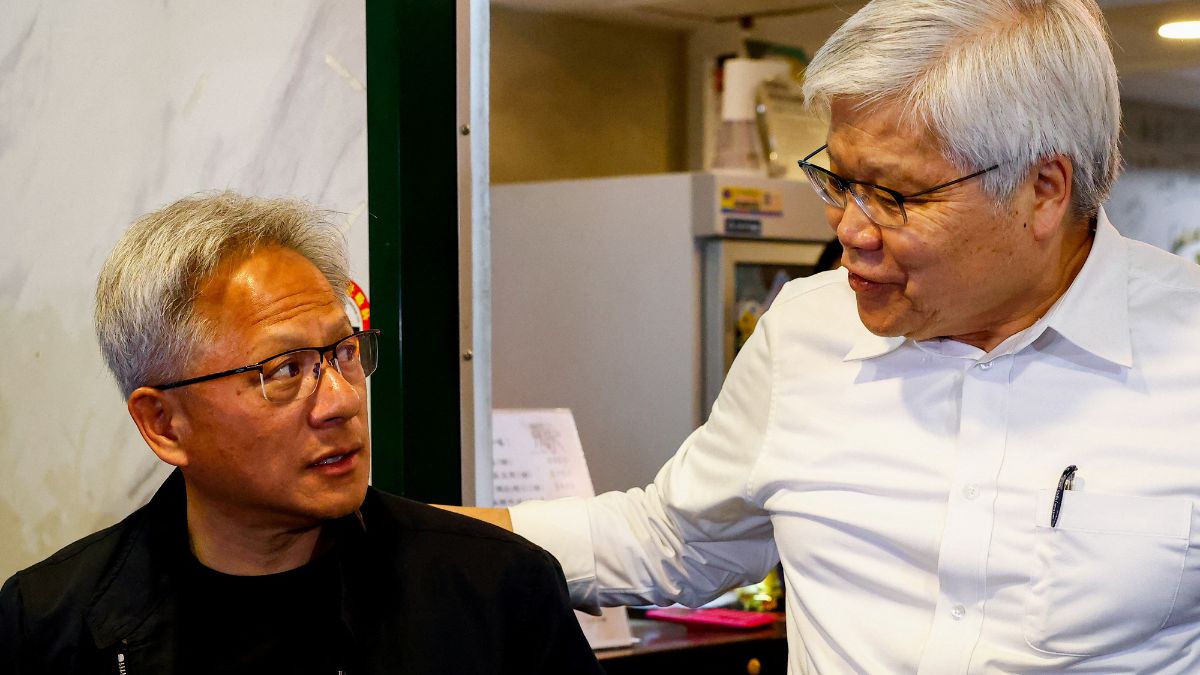Chip giants meet: What is brewing between Nvidia CEO Jensen Huang and TSMC CEO C.C. Wei?
 Nvidia CEO Jensen Huang (left) with TSMC CEO C.C. Wei (right) in Taipei | REUTERS
Nvidia CEO Jensen Huang (left) with TSMC CEO C.C. Wei (right) in Taipei | REUTERS
When Nvidia CEO Jensen Huang ahead of next week’s COMPUTEX, Taipei’s headliner IT summit, told Taiwanese media that he was meeting TSMC CEO C.C. Wei for dinner late on Friday, it sent a new set of shockwaves across the sector. This ‘dinner date’ of industry titans holds a much bigger significance for the future of the semiconductor industry in the world, especially as the United States and China are locked in a trade-tariff battle.
With US President Donald Trump looking to strongarm China to submission with on-and-off retaliatory tariffs and Chinese President Xi Jinping not looking to back down, uncertainty clouds the semiconductor market that flows around the world connecting these two geographies.
Also Read | India to get sixth major semiconductor plant; HCL-Foxconn unit to add 2,000 jobs
This means that tech hardware megafirms such as Nvidia are looking to see how to approach the Chinese market, especially after Trump curbed the sales of its Hopper H20, one of Nvidia’s most advanced chips under the Hopper microarchitecture.
No Hopper chip for China: Nvidia CEO
A day after the dinner, Nvidia CEO Huang told Taiwanese media in Taipei that China would not get a Hopper chip. Perhaps, to soften the blow, he stated that the Hopper cannot be upgraded or modified anymore.
Huang also criticised the Biden administration’s controversial ‘AI diffusion rule’, which involved a sports league-kind of a tiered system for countries accessing AI chips first.
For instance, close US allies like Japan and South Korea were tier 1 and had almost no new restrictions. And tier 3, which included China and Russia, would, in effect, be banned from getting US chips or face almost impossible curbs.
However, the real problem lay in the middle, in tier 2, which featured India, Mexico, Portugal—even Switzerland. This meant the US could police which and how advanced the AI chips these countries could import, essentially gatekeeping technology.
Barely days after the US Department of Commerce (DOC) under the new Trump administration decided to backtrack on changing the AI diffusion rule, the Nvidia CEO did not mince his words in Taipei, calling the previous AI diffusion rule “wrong”. He said that, instead of restricting tech, it should be about “maximising” US technology all over the world.
TSMC (Taiwan Semiconductor Manufacturing Company) is the world’s largest contract silicon photonics chip manufacturer—it produces chips for major giants like Nvidia, and even Apple. Earlier this year, Huang met Wei and later announced a partnership between Nvidia and TSMC to develop silicon photonics.
However, Taiwanese industry experts then reasoned that it would take both tech giants a significant amount of time to yield any concrete results.
Nvidia is the world’s foremost AI chip designer. With TSMC providing cover fire, the American tech giant can go all out with its development of AI-first chips. At next week’s COMPUTEX, the expectations would be sky high. Industry watchers would be on the lookout for major announcements between these two chipmaking giants.
With India looking to lift its chipmaking and assembly capabilities with massive installations in progress under the India Semiconductor Mission, what these manufacturing giants decide would have a ripple effect on policy, going forward.
Business